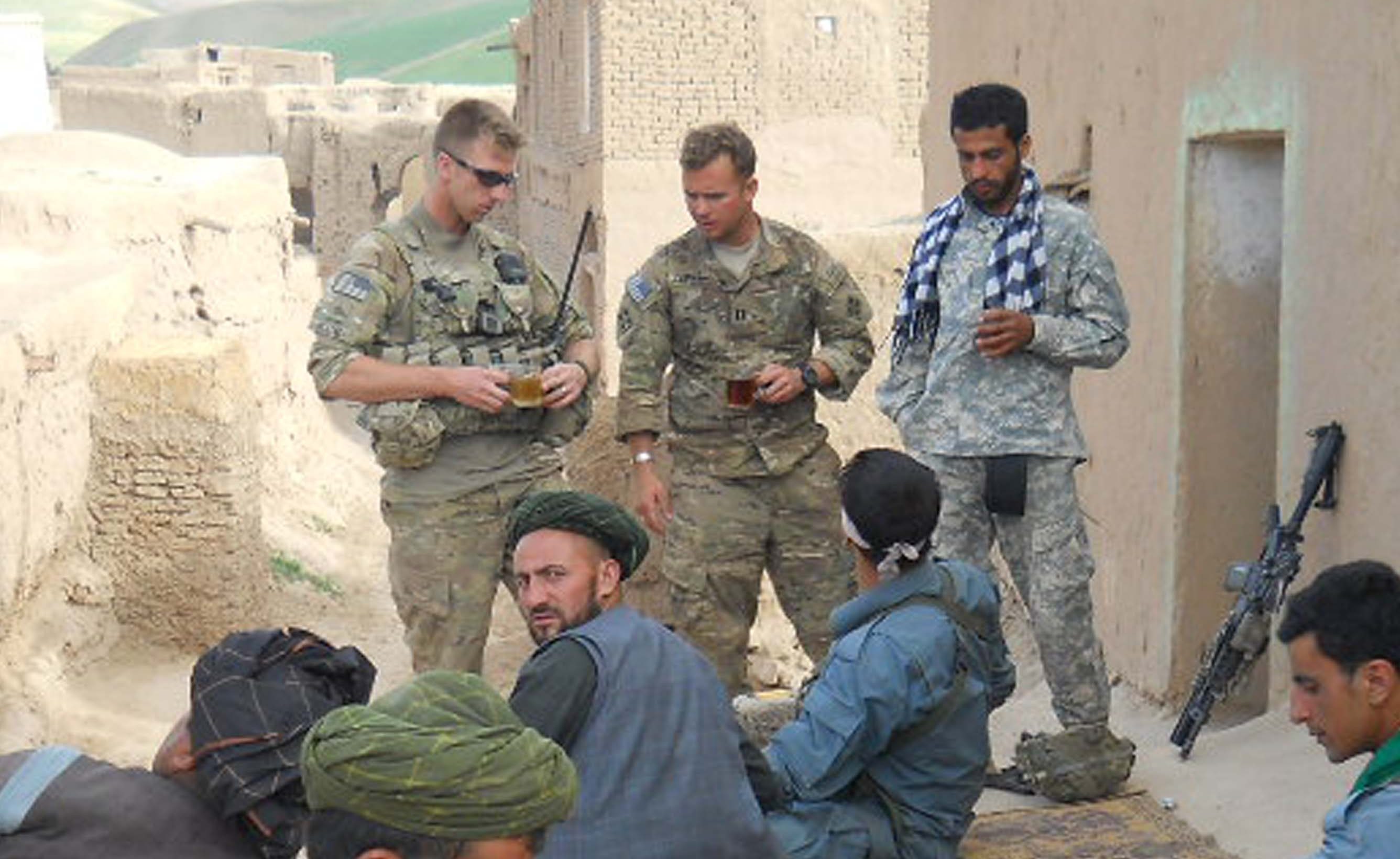
On May 11, 2011, Capt. Garrett Cathcart was leading a patrol to the Ghala Charkh village in Badghis Province, Afghanistan. As a troop commander in the 10th Cavalry regiment, 4th Infantry Division, his mission was to help the village defend against the impending threat of the Taliban at the request of his Afghan National Police commander, Chief Israil Mo, who had family living in the village.
What Cathcart didn’t know was that the Taliban had already recruited people inside the village to their cause, including Mo’s cousins.
As Cathcart’s vehicles approached, gunfire erupted from the village. Cathcart returned fire and began coordinating fire missions from overhead Belgian F-16s, which dropped two 500 lbs. bombs, and then Apache attack helicopters. The firepower of the aircraft “broke the morale” of the Taliban fighters.
“That’s when it gets interesting because the chief, his family’s in there. They’re the ones shooting at us,” Cathcart said. “He said, ‘Hey, sir commandant, they want to talk to you.’ Like, we were just in a broad daylight gunfight, and we killed three or four of their dudes. I was like, ‘They want to meet me? What is happening?’”
With Apache attack helicopters still on station and Cathcart’s team pulling security, he walked to an arranged meeting place with village elders, his radio operator, and Mo. So began a life-changing experience for Cathcart.
He sat down with several of the people with whom he was just exchanging shots, but this time, drinking tea.
“I realized, like, ‘Dude, there are shades of Taliban—these are not hardcore [extremists], who hate my existence and want to destroy my way of life and erase America and Christianity,” Cathcart said. “Like, they are just farmers trying to carve out a life. They were told to ‘shoot the Americans, or we’re gonna rough you up or kill you.’ I think the chief knew what he was doing to bring us together.”
Cathcart said he was used to things ending with flex-cuffing the bad guys and sending them to detention centers for questioning. Instead, the leaders connected and developed an understanding. In a show of good faith, Cathcart left cans of gasoline for the villagers’ motorcycles and later coordinated the rebuilding of a critical bridge nearby.

Cathcart served nine years on active duty, deploying to Iraq and Afghanistan and left the Army in 2013. He landed at a new veteran-focused non-profit, Team Red, White, and Blue. Later, he helped establish a second group, Mission Role Call. Team RWB is a wellness-oriented group that has programs based on improving physical fitness and mental health, and Mission Roll Call is a veteran advocacy group.
“This is what I missed, man, it’s helping people doing something I believe in. being around good, great people,” Cathcart said. “So that’s what got me into the social entrepreneurship space, the veteran space.”
Cathcart joined the Army Reserve in 2018 and is now a major.
In 2021, Cathcart wondered if his surreal experience with the Taliban might be a blueprint for a new project at home. Like many veterans, he watched in dismay as, after returning home, he saw political polarization rise and begin to seep into everyday life. He wondered if more face-to-face time could unwind differences at home. To find out, he co-founded +More Perfect Union with Jake Harriman, a former Marine Recon officer with deep ties to veteran service organizations.
Established in 2021, the organization focuses on bringing veterans and other Americans from differing points of view — whether on politics or just lived experiences — together through social settings like his experience with the Taliban.
“There are different shades of Taliban—and we were trying to kill each other—and we found common ground and helped each other,” Cathcart said. “I mean, that’s a dramatic example of what we’re doing here in this country. We are not only all humans, but we’re all Americans. We have so much in common.”

Cathcart said the veteran community is key to bridging misunderstandings because the military itself is a melting pot of cultures, beliefs, and identities. The organization sponsors get-togethers called ‘brickyards,’ which might feature a picnic-style chance to eat or community service projects like cleaning up a park.
In a recent meet-up in Glen Rose, Texas, a brickyard leader donated a pig that participants smoked for 18 hours. The resulting picnic and meal were held in conjunction with a clothing drive. The event brought together immigrants from Mexico and long-time residents to eat and pick out needed clothing items.
“When you’re sharing a table with someone, sharing a meal, that’s one of the most human, intimate experiences,” Cathcart said. “We started this a couple of years ago, and it just clicked. This is what we’re trying to do. I need to do 20 million of these.”
With over 15,000 members of the different chapters called brickyards, their mission has reached 31 towns and cities. Each brickyard has a leader who organizes events for their chapter, and the non-profit raises funds so that chapters can hold community events.
“We all love this country. We bring people together and build relationships, trust, and understanding through awesome ways. You are going to get to know people you wouldn’t ever meet, from a different walk of life, a different from the other side of the aisle. Let’s just say it out loud. They realize, like, ‘Oh, dudes, I don’t agree with you on all this stuff, but we have a lot in common.”
